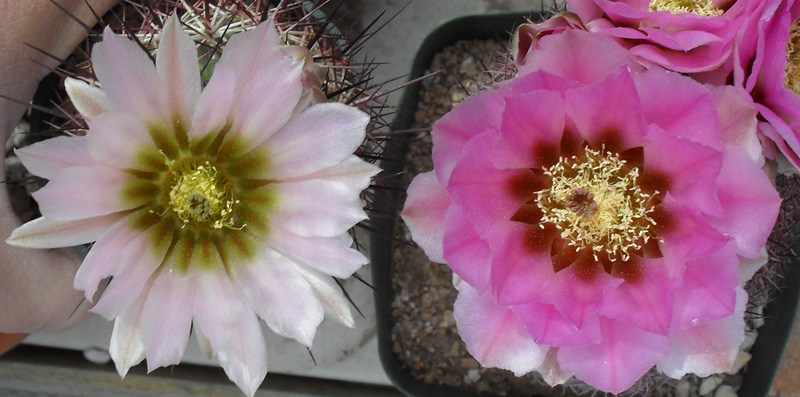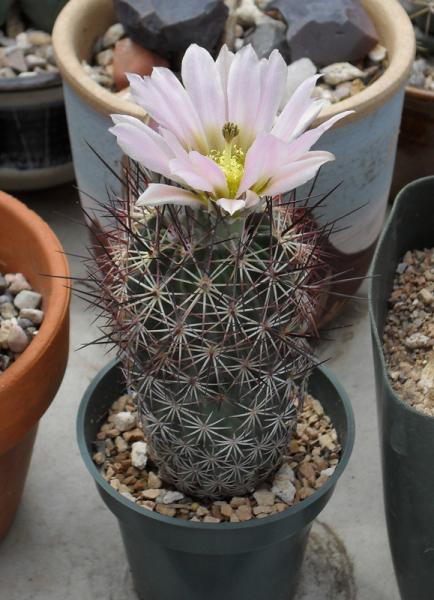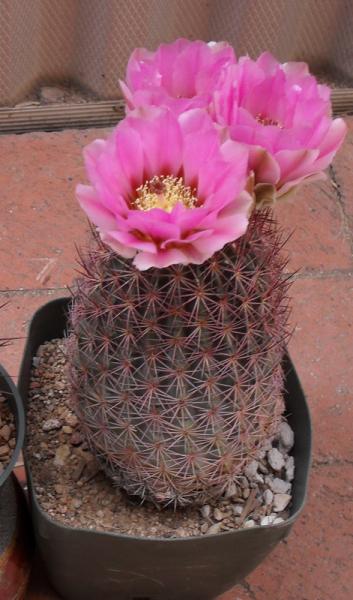Page 2 of 4
Re: Echinomastus
Posted: Tue Mar 27, 2012 5:50 pm
by tumamoc
This is some frightening reading about Echinomastus acunensis in the Organ Pipe Cactus National Monument.
http://www.npca.org/news/magazine/all-i ... pects.html
Re: Echinomastus
Posted: Tue Mar 27, 2012 6:10 pm
by jnspire
Your post is interesting, in that cacti have climatized to unlivable dessert conditions; But, faced with these new threats they are dying off in masses. Which (to me) begs the question: What will the cacti of the future look like? and what will they be resistant to?
Interesting ideas... thanks for the post!
Re: Echinomastus
Posted: Tue Mar 27, 2012 6:41 pm
by peterb
Field observation of the acunensis populations near Florence and in Sonoyta, Sonora show a roughly 1:1 ratio of sexually mature plants and dead plants. They are vulnerable indeed to the larvae that hatch from eggs deposited by beetles. Older plants are eaten from the inside out and leave only a spine cage. Several Sclerocactus populations all over the range of Sclerocactus ss are vulnerable to this same phenomenon. However, I don't think we have enough long term data to attribute this high mortality rate to climate change. It may be that these plants are co-adapted with the beetles. I have noticed that a great many of these "beetle impacted" populations flower and set seed at a very young age, probably only about 4 years old or so. The seed is relatively prolific, with about 40-70 seeds per fruit and about 12 fruits per plant, so in a population with only 30 plants, each good flower/seed year produces something like 1500-2000 seeds.
It does seem like the population in Florence is more marginal and has a more tenuous presence and the population in Sonoyta is more robust. In Florence, the plants will *only* grow on south or west facing gentle slopes, no exceptions. In Sonoyta, they seem happier in a wider variety of orientations, probably a subtle response to the somewhat warmer climate in Sonoyta. I have requested habitat info for the Ajo and Coffee Pot Mountain populations and requested access to the Organ Pipe population (the type locality), but folks are very secretive about this sort of thing, for understandable reasons. The type locality is actually closed even to Sue Rutman, due to the danger from drug and human smuggling violence.
Anyway, the article seems to suggest that the plants are all out of the ground because of insects, not at all the case. The plants are ejected from the ground probably by extreme weathering conditions. Echinomastus don't grow very deeply seated and repeated freezes and thaws sometimes just work them loose altogether.
anyway, interesting article. It also doesn't mention that the main obstacle to listing acunensis is that it isn't a species.

peterb
Re: Echinomastus
Posted: Tue Mar 27, 2012 6:47 pm
by daiv
Yes, the article even points out that all of their conclusions are speculative at this point. It is definitely good that people are studying it. Hopefully, they will let the data lead them to conclusions and not try and fit the data to the conclusions. The biggest question I have is whether or not these beetles are native?
If so, it could be that the plants and beetles have a cycle of rise and fall that somehow works. (If we were entomologists would we all be rooting for the beetles?)
If they are not, then this could very well be another disaster resulting from introduced species wreaking havoc on native populations. I think introduced species are probably more harmful than anything on a wide scale. (Habitat destruction on smaller scales.)
Re: Echinomastus
Posted: Tue Mar 27, 2012 7:00 pm
by peterb
The beetles seem to be native. In the Sonoran, it seems the main culprit is Moneilema gigas.
peterb
Re: Echinomastus
Posted: Tue Mar 27, 2012 8:21 pm
by Tiggy
Whatever the differences, they are all gorgeous!
Susi
Re: Echinomastus
Posted: Tue Mar 27, 2012 8:31 pm
by electric_elle
wow very nice
Re: Echinomastus
Posted: Sat Apr 07, 2012 10:17 pm
by tumamoc
Well, it finally happened. These two plants bloomed on the same day. The flowers couldn't be more different. I've had the acunensis for three years and this is the first time it has bloomed.

- vars. acunensis (left) and erectocentus (right)
- erectocentrus.jpg (147.18 KiB) Viewed 1573 times

- acunensis-profile.jpg (46.81 KiB) Viewed 1573 times

- erectocentrus-profile.jpg (37.98 KiB) Viewed 1573 times
In case anybody is wondering, the cactus shown above was salvaged 5 years ago.
Re: Echinomastus
Posted: Sat Apr 07, 2012 10:30 pm
by peterb
Beautiful! Is the acunensis from the Florence population in Pinal County? The flower looks like it. The ones down in Sonoyta Sonora have flowers somewhat more similar to the erectocentrus.
Very well grown!
peterb
Re: Echinomastus
Posted: Sat Apr 07, 2012 10:44 pm
by tumamoc
Yes, I'm pretty sure the acunensis is from Florence seed. The erectocentrus is from the San Manuel area. Not really that far apart if you think about it.
Re: Echinomastus
Posted: Sat Apr 07, 2012 11:14 pm
by Minime8484
Beautiful!! Congrats on your first acunensis blooms!!
Re: Echinomastus
Posted: Mon Apr 09, 2012 2:46 am
by CoronaCactus
Awesome!
Great plants, Greg!
Re: Echinomastus
Posted: Mon Apr 09, 2012 5:52 am
by Arjen
remarkable difference between those flowers, very beautiful ones too!
Re: Echinomastus
Posted: Sat May 05, 2012 10:19 pm
by tumamoc
So I cross-pollinated my Echinomastus erectocentrus cacti (vars. echinomatus and acunensis) just over a month ago. These buds haven't shriveled up and fallen off.
Are they fruit?

- echinomastus detail.jpg (197.74 KiB) Viewed 1525 times
Re: Echinomastus
Posted: Sun May 06, 2012 5:46 pm
by peterb
Yes, they look like they will have seed. wait for them to start dehiscing, but keep an eye on them, as ants often come and take all the seed away overnight.
peterb